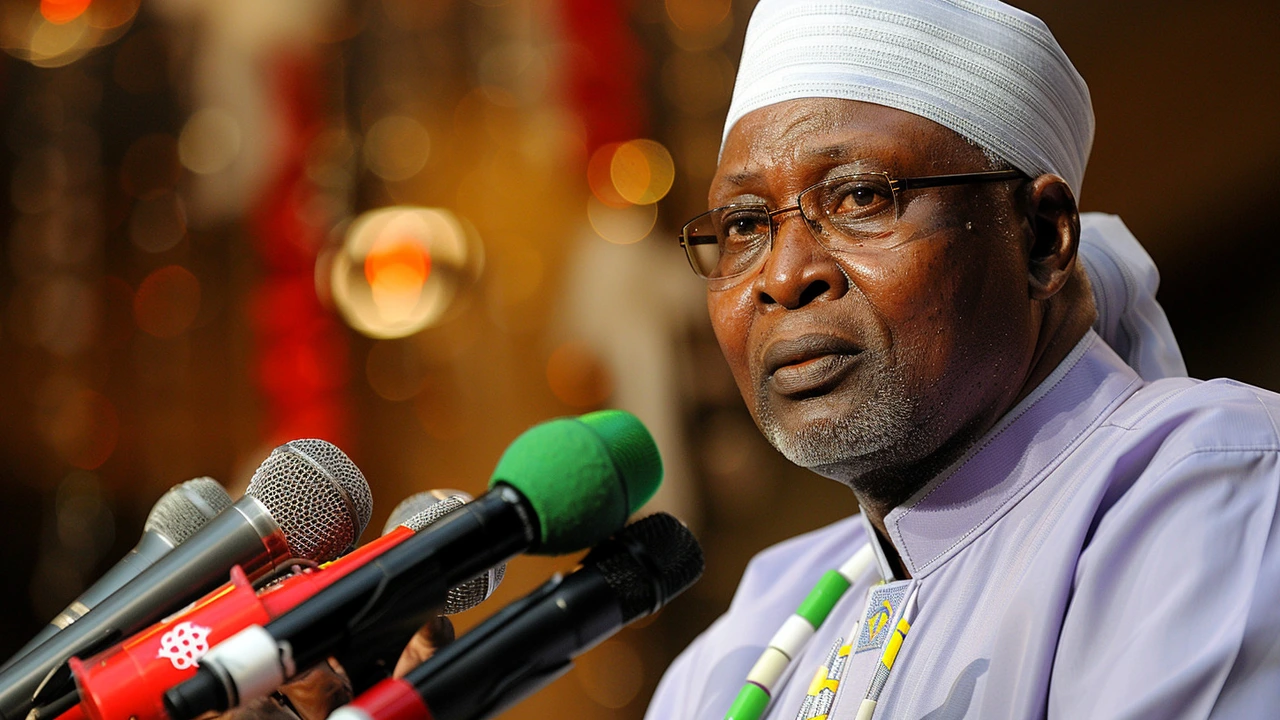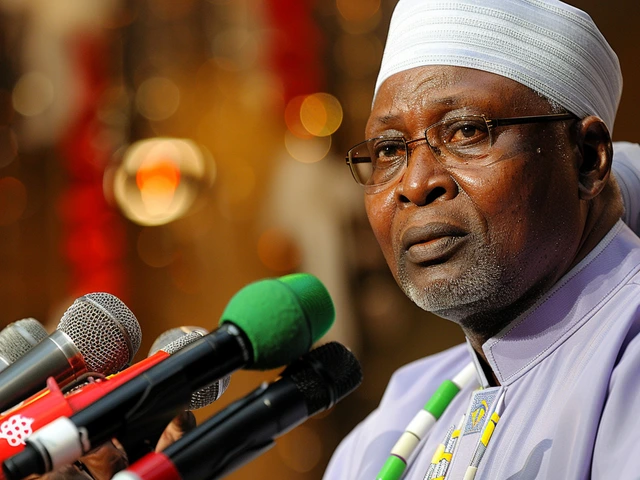Atiku Criticizes Nigeria's Economic Policies in Tinubu's First Year: Calls for Immediate Reforms
Former Vice President Atiku Abubakar has leveled sharp criticism at President Bola Tinubu's administration, marking the president's first anniversary in office with a scathing review. Atiku argues that Nigeria remains encumbered by a struggling economy, largely due to what he describes as Tinubu's 'trial-and-error' economic policies. These policies, Atiku claims, have led to a deterioration of Nigeria's macroeconomic stability, posing severe challenges to the welfare of its citizens.
Unfulfilled Promises and Economic Challenges
When President Tinubu took office, he made ambitious promises aimed at rejuvenating Nigeria's economy. He vowed to remodel the economy, create job opportunities, ensure food security, and eradicate extreme poverty. Yet, according to Atiku, these commitments have not materialized. The former vice president contends that rather than progress, Nigeria's economic landscape has worsened over the past year.
The country's economy, which was once a beacon in Africa, has now slipped to the fourth position on the continent. Nigeria trails behind Algeria, Egypt, and South Africa, hampered by soaring inflation rates and a burgeoning cost-of-living crisis that has left many households struggling. This economic downturn, as Atiku points out, is a clear sign that the current policies are not yielding the intended results.
Contentious Policies
Atiku identifies several policies that, in his view, have contributed significantly to Nigeria's economic woes. One of the most contentious among these is the elimination of Premium Motor Spirit (PMS) subsidies. The removal of these subsidies has led to an increase in fuel prices, placing additional financial strain on both businesses and consumers. Another critical policy is the unification of foreign exchange rates, a move that, according to Atiku, has not stabilized the currency as expected and has instead exacerbated inflationary pressures.
Additionally, the introduction of cost-reflective electricity tariffs has been met with widespread disapproval. These tariffs have made electricity more expensive for citizens, further compounding the financial burdens on already vulnerable households. The combination of these policies, Atiku argues, has led to a decline in the standard of living for many Nigerians.
Call for Comprehensive Review
In light of these challenges, Atiku stresses the urgent need for a comprehensive review of the 2024 budget and the Social Investment Programme. He insists that these reviews are essential to mitigate the adverse effects of current policies on vulnerable households. The former vice president is advocating for targeted interventions that can provide immediate relief to those most affected by the economic downturn.
Proposed Measures for Economic Recovery
To address Nigeria's economic challenges, Atiku has outlined six measures for President Tinubu. First, he suggests pausing and reflecting on the current reforms to assess their impact and efficacy. This step, Atiku believes, is crucial for identifying any unintended consequences and making necessary adjustments.
Secondly, undertaking a rigorous budget review is imperative. Atiku emphasizes that the budget should be realigned to prioritize sectors that can drive economic growth and provide immediate relief to struggling households. This review should also focus on enhancing the efficiency of public spending to ensure that resources are allocated effectively.
Supporting medium and large-scale enterprises forms another critical component of Atiku's proposed measures. He argues that fostering a conducive environment for these enterprises can stimulate job creation and drive economic growth. This support could include financial incentives, reduced regulatory hurdles, and targeted investment in key industries.
Atiku also underscores the importance of tackling security issues that have plagued Nigeria. In his view, economic stability and security are intrinsically linked. By addressing security challenges, the country can create a safer environment conducive to investment and economic activities.
Moreover, enhancing social protection mechanisms is paramount. Atiku suggests that the government should expand its Social Investment Programme to provide comprehensive support to vulnerable groups. This could include cash transfers, food assistance, and investment in social infrastructure such as healthcare and education.
Finally, Atiku calls for transparent and accountable governance. He insists that for economic policies to be effective, there must be a robust framework for monitoring and evaluating their implementation. Transparency and accountability are essential for building public trust and ensuring that resources are used efficiently.
Conclusion
As President Tinubu marks his first year in office, the criticisms from Atiku Abubakar serve as a stark reminder of the challenges that Nigeria continues to face. While Tinubu's administration has undertaken significant reforms, the outcomes have been mixed, with many Nigerians feeling the pinch of economic hardships.
Atiku's call for a comprehensive review of current policies and the implementation of targeted measures highlights the urgent need for a reassessment of Nigeria's economic strategy. The proposed interventions aim to provide immediate relief to vulnerable households and set the country on a path to sustainable economic recovery. Only time will tell if these recommendations will be heeded and whether they will lead to the desired improvements in Nigeria's economic landscape.






Quinten Squires
May 30, 2024 AT 00:01Atiku throws shade at the current policies like he’s holding a megaphone at a silent room. He lists the fuel subsidy removal, the FX unification, the power tariffs and calls them all trial and error. The tone feels like an old‑school politician trying to remind everyone about the same old problems. It’s hard to ignore the emotional drift when the facts keep piling up.
Tyler Manning
May 30, 2024 AT 00:08It is incumbent upon every patriot to scrutinise the administration’s approach to the economy, yet one must do so with a measure of decorum and patriotism. Atiku’s lamentation, while couched in rhetoric, betrays a lack of constructive vision for the nation’s future. A truly national‑first policy would eschew partisan indictment in favour of pragmatic, evidence‑based reform, lest we descend into perpetual blame‑games. Moreover, the populace deserves leadership that unites rather than divides.
james patel
May 30, 2024 AT 00:16The macro‑economic indicators referenced-inflation volatility, exchange rate stabilization, and power sector cost‑reflectivity-are critical levers in the structural adjustment framework. However, the policy mix must be calibrated against wage‑growth elasticity and fiscal deficit trajectories to avoid adverse spill‑over effects. A holistic econometric modeling approach could quantify the marginal impact of each reform on real GDP growth. In essence, evidence‑driven policy overrides ad‑hoc adjustment.
Scarlett Mirage
May 30, 2024 AT 00:33When Atiku stands at the podium, he is not merely reciting a roll‑call of grievances; he is, in fact, invoking the archetype of the eternal critic, the Cassandra of Abuja, whose proclamations echo through corridors that have long forgotten the scent of reform! He enumerates the subsidy withdrawal, the unification of the foreign exchange market, the cost‑reflective electricity tariffs-each item a symptom of a deeper malaise, a systemic inertia that refuses to heed the clarion call of progress! Yet, to merely catalogue failures without offering a teleology of hope is to wade in the shallows of rhetoric while the tide of despair rises! The economics of scarcity demand that we, as a collective, interrogate not only the "what" but the "why" behind each policy decision; we must ask whether the political calculus has eclipsed technocratic prudence, whether the allegiances to patronage networks have supplanted the imperatives of fiscal sustainability! In the theater of governance, where the curtain rises on each fiscal year, the audience-comprised of millions of Nigerians-deserves a script that balances austerity with ambition, and empathy with efficiency! Let us then contemplate the notion that the removal of PMS subsidies, though painful in the short run, may be justified if accompanied by a targeted cash‑transfer mechanism that cushions the most vulnerable; similarly, the unification of FX rates, while destabilizing in the transitional phase, could herald a more transparent market if buttressed by robust foreign exchange reserves! The electricity tariffs, draped in the mantle of cost‑reflectivity, must be paired with investments in renewable infrastructure to lower the marginal cost of generation-failure to do so merely reshapes the burden without alleviating it! Atiku’s exhortation for a comprehensive budget review is not merely a call for bureaucratic tinkering; it is a summons to re‑engineer the very architecture of fiscal policy, to embed accountability mechanisms that transcend the whims of electoral cycles! Moreover, the synergy between security and economic vitality cannot be overstated: a nation beset by insurgency cannot attract the capital inflows requisite for growth, and without growth, security initiatives falter-a vicious feedback loop! In sum, the route to recovery lies not in the binary of blame versus praise, but in the dialectic of constructive critique paired with actionable, data‑driven solutions; only then can the Nigerian economy ascend from the quagmire of stagnation to the plateau of sustainable prosperity.
Ian Sepp
May 30, 2024 AT 00:41While the concerns raised are indeed valid, it is essential to differentiate between policy intent and implementation gaps. A structured review can isolate inefficiencies without discarding the overarching strategy. Moreover, transparency in budgeting will foster public trust.
Sweta Agarwal
May 30, 2024 AT 00:50Oh great, another budget review. Because nothing screams "we’re on it" like a committee meeting that will probably end with the same old headlines. 🙄
Henry Cohen
May 30, 2024 AT 00:58Honestly the whole thing is a circus, the subsidies were a joke from day one and the fx unification just made it worse the currency kept falling and people cant pay bills its all just a mess.
Mark Langdon
May 30, 2024 AT 01:06I get why people are frustrated – it’s tough out there. But ditching everything without a solid plan can backfire. If we can find a middle ground, maybe some targeted relief while fixing the bigger issues, that could help folks actually feel the change.
Ciara Russell-Baker
May 30, 2024 AT 01:15Atiku cant even get the basics right, its sus why he keeps talking about reforms when things still suck. #justsaying
Aaron Samarita
May 30, 2024 AT 01:16So many problems, so little time.
Daisy Pimentel
May 30, 2024 AT 01:18If we keep chasing the same old policy ghosts, we’ll never see a sunrise of real change. The moral compass must point toward the marginalized, not just the political elite.
Ellen Ross
May 30, 2024 AT 01:20One must inquire whether the discourse surrounding fiscal adjustments has transcended mere rhetoric to embrace a genuine epistemological shift, lest we remain entrenched in an echo chamber of superficial remedies.
Fabian Rademacher
May 30, 2024 AT 01:21Don't you think the whole economic mess is part of a larger agenda? Some folks want us busy with price hikes while they pull strings behind the scenes.